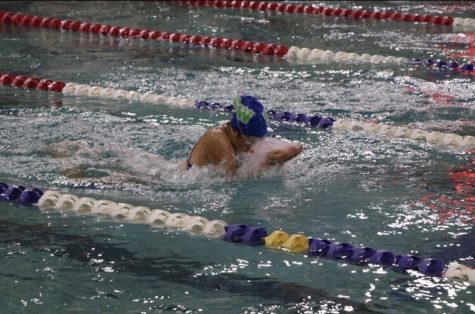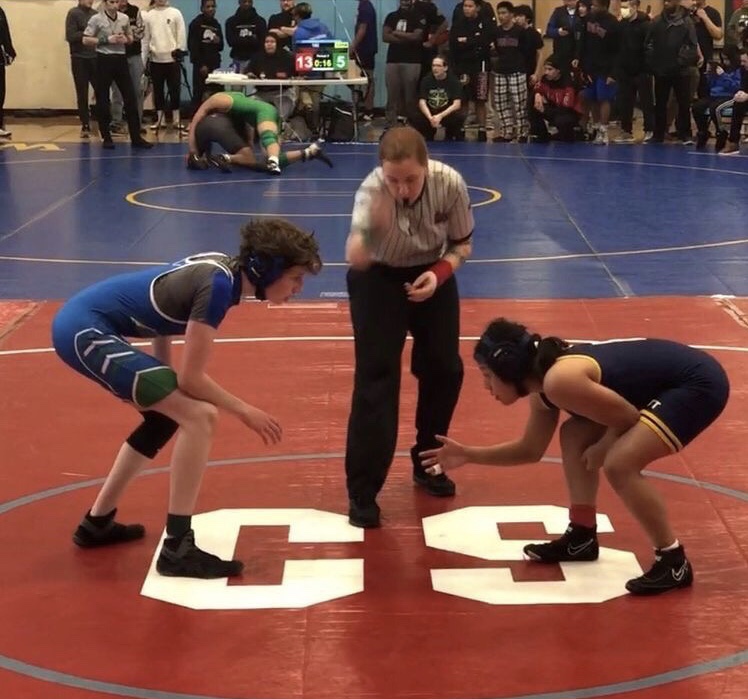What team do I belong on?
Shorewood athletics from the perspective of queer students
December 7, 2021

For many students, sports are a safe haven, a place for them to hone their skills while building a community. But for students within the LGBTQ+ community, this isn’t always the case.
While there are many queer athletes here at Shorewood, they all have to face unique struggles in the world of sports that cishet people (those who identify with their assigned gender at birth and are heterosexual) don’t have to deal with.
The most common way that this struggle is shown is through the existence of gendered sports teams. For cis people, they may never consider that there’s anything wrong with gendered teams. But for trans people and those outside of the gender binary, sports teams being separated into two genders can be very harmful.
The state of Washington and the Shoreline School District require student athletes to participate on teams that align with their assigned gender at birth. This requirement leads to situations such as the one Corin Lumsden, junior, is in.
Lumsden, a trans boy, plays on the girls wrestling team. While overall Lumsden doesn’t mind playing on the girls team, he has felt uneasy with it at times.
“When I go to girls’ tournaments, then I feel pretty uncomfortable, because all the announcers are like ‘welcome ladies,’ and that’s not very great,” Lumsden said.
Another student, who prefers to remain anonymous and identifies as agender, using they/them pronouns, also faces difficulties due to playing on a team that doesn’t match their gender. “One of the challenges presented by being on a girls [team] when I’m not a girl is the perceptions of other people,” this student said.
These perceptions, this stigma, against queer people in sports, is real for many athletes. Ronel Cooper, a senior on the Hip Hop team, says queer people are subject to a stereotype when it comes to their abilities.
“There is an unfair bias towards queer people in sports. I think that there’s this kind of…. preconceived notion that they’re less capable of doing something simply because they’re in the community,” Cooper said.
Cooper continued by saying “…that is far from the truth and I think if anything we have more potential because we’re able to be vulnerable already.”
Some feel it’s hard for queer athletes to be treated like everyone else when there’s this constant reminder of their identity from those around them. Fiona Blair, junior, wishes things were different. “I’d like it if people in professional sports, or just sports in general, would be able to be seen for more than just their queer identity through sports,” Blair said. “It’s the only thing they’re being recognized for… I think that can be kind of frustrating… for that to be the only thing seen.”
For some students, the best thing they can do is steer clear of gendered teams, or even of sports as a whole.
Ren Healy, senior, is a trans boy who plays for the bowling team, one of Shorewood’s few non-gendered sports. Healy said that he “definitely felt comfortable being on the bowling team because it wasn’t set up in a boy/girl way.”
Healy continued: “I’d be too scared to play on any teams that were organized by gender… I’d either be playing with a bunch of cis boys and wouldn’t really feel in place, or I’d be playing with a bunch of girls and I wouldn’t feel in place.”
Kate Clark, junior, feels most comfortable staying away from sports. Clark, who is a trans girl, grew up playing baseball. She almost joined Shorewood’s team her freshman year, but didn’t due to the sport not lining up with her gender identity.
Clark’s solution? “I think there should be coed teams,” she said. In her case, she hopes this would lead to more queer people doing sports. “I still think I wouldn’t [join the team] unless other trans people did,” she said, “because I want a place where I could feel welcomed and safe, and I know a lot of the times sports have a toxic air to them.”
Many other queer athletes agree with Clark’s desire for teams not separated by gender. Sophomore Alex Craft is non-binary and competes on the girls swim team. “I think [non-binary or coed sports teams] could be helpful for quite a bit of people… because then they don’t have to feel as overwhelmed with the fact that they are surrounded by people who might not understand what they’re going through,” Craft said.
Healy also wishes there were more mixed gender team opportunities. “There should definitely be coed sports teams… I don’t understand why people have to play with just their assigned gender,” said Healy. “People should be able to play on whatever team they feel comfortable with.”
Teams could potentially separate in ways other than gender. As the anonymous student put it, “We’ve spent years figuring out how to break up sports by strength and ability, so finding a way to do that with teams that aren’t based on gender would be absolutely possible.”




